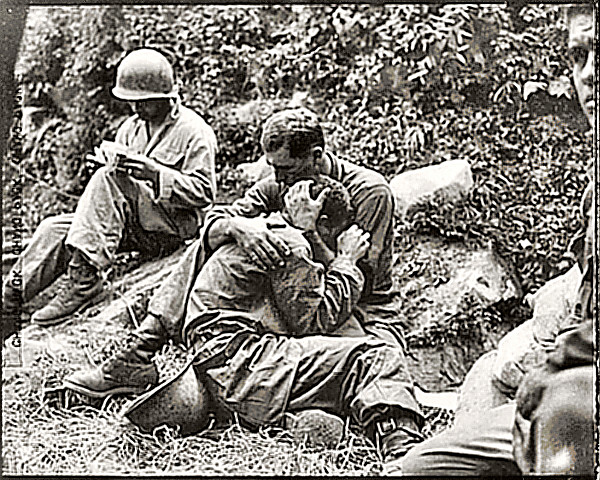
Table Contents
Forum
Pictures
Tales of Nam
Links
Contact
About
Privacy Policy
Search This Site


You Are Not Alone. Of course, you could make it alone if you had to. You are one of the few, the chosen, the strong. The weaker ones have problems, but you just suck it up and move on. You have been through hell and somehow survived. That is proof enough that you can take whatever life throws at you. Sound familiar?
Neither do you have PTSD, because you don't have any of the following symptoms:
Those Memories
flashbacks to combat experiences.
intrusive thoughts and images about your service in combat.
nightmares.
emotional distress and/or physical reactions to sights, sounds, smells, or places associated with combat trauma.
Anxiety and Irritability
difficulty sleeping.
irritable responses.
angry or violent outbursts.
difficulty concentrating.
hypervigilance.
exaggerated startle response.
Avoiding Experiences
avoiding thoughts of the traumatic combat experiences.
inability to recall significant combat events.
avoiding the feelings associated with the original combat events.
avoiding talking about your combat experiences.
avoiding places and things that remind you of the traumatic combat events.
general lack of emotional feelings or emotional connection with others.
I remember vividly how I felt when I first saw this list. Like most of us, as I was reading through it I was mentally putting checkmarks by the items on each line. When I got to the end of the list and realized that every line on it was checked off, I decided I might just have PTSD. It also occurred to me that a whole lot of my brothers and sisters in arms might have it also if someone had taken the trouble to put together the inventory of symptoms.
In my opinion most combat veterans suffer from some form of Post Traumatic Stress (PTS) just as most everyone in civilian life suffers from occasional situational depression. Combat-related PTS comes from having been trained and programmed to kill other people, and then being placed in a situation where this is not only possible but expected of you. The training you get does not dwell on the fact that those 'other people' have also been conditioned to kill you, but they have. It is my opinion that, just as with symptoms of depression, most combat veterans experience some of the effects of PTS and manage to move on with their lives without developing a clinical condition. The rest of us are not so fortunate. Sometimes as the symptoms worsen we are taken down by PTSD during the months and years after we return home and muster out; and we may end as suicide statistics, drunks, drug-abusers, or derelicts sleeping under freeway overpasses. Others, including yours truly, build a wall around the problem, and tell ourselves we will deal with it later. We can go on for decades paying the price of maintenance on that wall, and lead reasonably successful lives until something or someone causes that wall to begin to crumble and give way. Either way we are walking wounded.
That war changes human beings permanently has been understood since the first tribes decided that the best way to settle a border dispute was to draw the territorial boundaries in blood. In keeping with the current trend to label each of our emotional traumas or maladies with a politically correct phrase, what used to be called by the Spartans hesma phobou or "fear shedding," and was known as "shell shock" in World War I, and "combat fatigue" in World War II, is now termed Post Traumatic Stress Disorder (PTSD). Whatever you call it, you better deal with it, or it will deal with you.
When it first hit me that I suffered from PTSD, knowing that I was but a small part of a large group of comrades who exhibited the same strange behaviors that were messing up my life did not make me feel a whole lot better about my own problems, but it did help me somehow to move from the wallet sized snapshot to the big picture. Gaining perspective doesn't necessarily make the job easier, but it can make it look a trifle less monumental. I decided to get some help. You might want to consider doing likewise.


Home | Contents | Forum | Pictures | Tales | Links | Contact | About | Privacy | Search
Original Content, Text, and Design copyright ©2009, Will Henry.
With non-exclusive license to content, with attribution, for non-commercial use only.
No claim made as to animated gifs and still jpeg images.
All other rights reserved.
Last updated on September 6, 2011